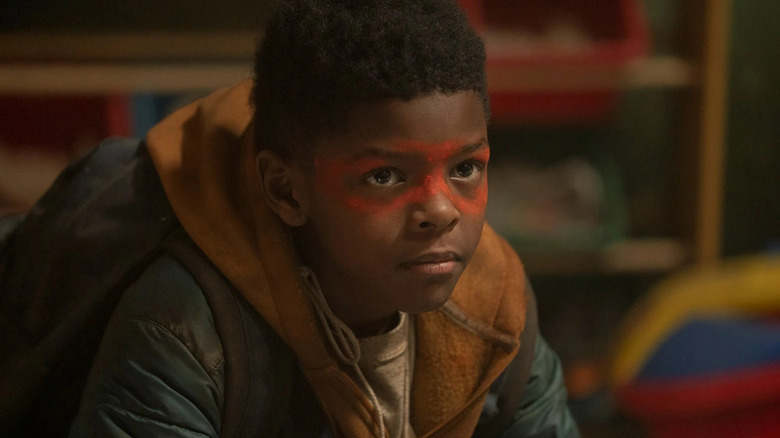
Our Kansas City detour ended in episode 5 of "The Last of Us," and with it, so too did the lives of new characters Kathleen (Melanie Lynskey), Henry (Lamar Johnson), and Sam (Keivonn Woodard). With so many details about these three characters changed or added for the show, the writers were sure to still speak directly to players of the game with certain nods.
For example, Kathleen's right-hand man, Perry, was played by Jeffrey Pierce, the voice actor for Tommy in the game. (The voice actors for Joel and Ellie, Troy Baker and Ashley Johnson, are also slated to appear in the series.)
For true devotionals of the game, the underground society of Ish was also portrayed in this episode. Ish and his sewer-dwelling community are discovered in the game via notes left behind by him and his companions. Long overtaken by infected by the time Joel (Pedro Pascal) and the group encounter the sewers, both the game and series show what remains of Ish's former home. Considering notes are scavenged extras in many games, the makers of this show including inessential details from the game once again indicate their reverence for the source material.
With this reverence, the writers created new stories that still feel plausible to the game's universe.
Thickening The Plot
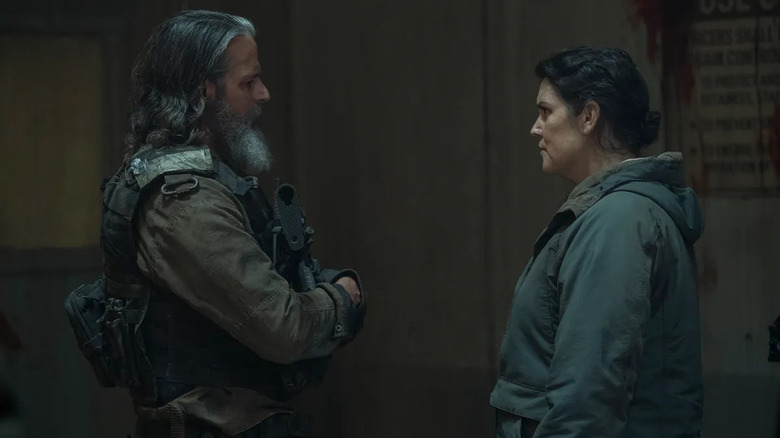
The backstory between the delightfully villainous Kathleen and Henry, as mentioned in the episode 4 comparison, did not exist in the game. Henry and Sam were just two people passing through Pittsburgh trying to get to the Fireflies out west.
In this episode, we learn that Henry is responsible for FEDRA jailing and executing Kathleen's brother, Michael — but he had good reason. Sam had leukemia, and FEDRA had the medicine that would keep him alive. They promised to give it to Henry under the condition that he rat out Michael, the leader of the revolutionary group trying to overthrow them. Of course, Henry obliged. Wouldn't you?
Kathleen also explains to Perry how Michael was much gentler than her. He was forgiving, even telling Kathleen that he forgave Henry for cooperating with FEDRA before his execution. This aligns with what Henry told Joel about Michael, that he was an admirable man worth following.
Kathleen and Henry, both making sacrifices for the people they had left in this horrible world, are two sides of the same coin. We'll talk about the narrative implications of their stories a bit later.
The Innocence Of Sam
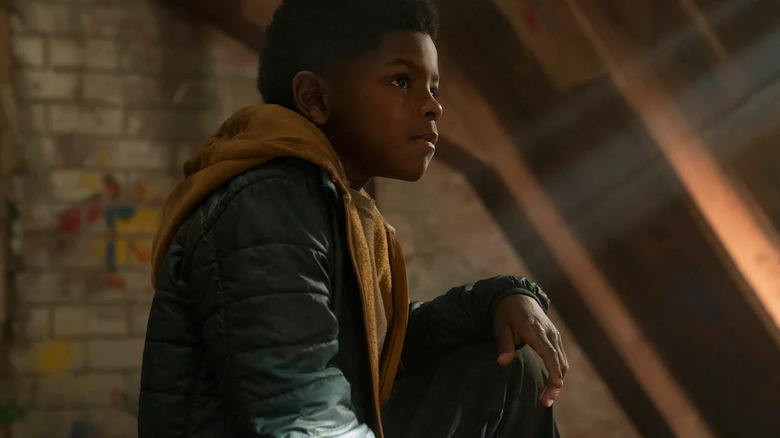
Sam's character was tweaked a bit for the show. In the game, he is closer in age to Ellie (Bella Ramsey) at around 12; in the show, he's 8. Similar to aging Joel up by a few years, making Sam a child rather than a preteen adds innocence to his aura. His single-digit age ensured that his death would evoke a stronger reaction, even if only marginally.
The most significant change with Sam is his hearing. He is deaf in the show when he isn't in the game. Ultimately, this change doesn't really affect the story adaptation; all of his narrative beats are left untouched in the show. But his inclusion is a big step for other reasons: we had a Black, deaf, child actor on an HBO drama, y'all! That's a big deal! It's refreshing to see a disabled character in an apocalyptic drama.
Fans across fantasy and sci-fi series have long decried the inclusion of marginalized identities. For whatever reason, zombies, dragons, mages, and elves are imaginable in these worlds but Black, disabled, or queer people are not. With characters like Henry, Sam, Bill, Frank, and (spoiler) Ellie, "The Last of Us" is acknowledging that oppressed peoples would endure and survive at the end of the world.
For a disabled person, Sam is particularly important as a character. In dystopias like that in "The Last of Us," people default to eugenicist "survival of the fittest" ideologies fairly quickly. But, just as disabled people have done past and present in this country, Sam found a way to survive. Disabled folks survive through either their own wiles or having someone to protect and advocate for their needs. Sam was fortunate enough to have both.
Ellie And Sam's Heart-To-Heart
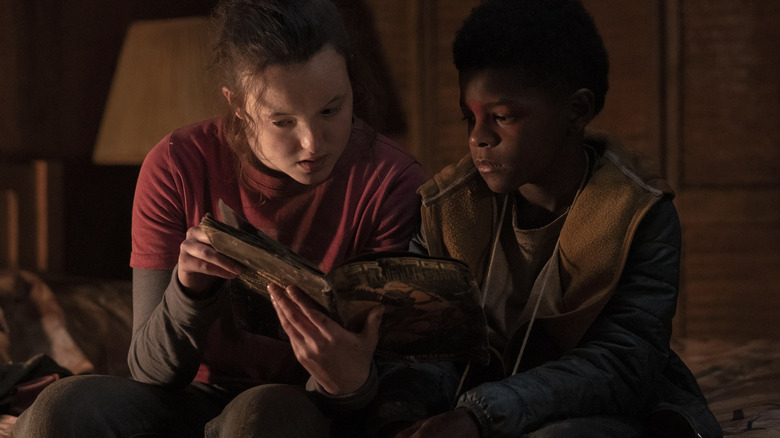
The conversation at the end of the episode between Ellie and Sam is mostly in keeping with the game. The dialogue was not exact, but the sentiments discussed were the same.
Sam asks Ellie how it seems she's never scared, to which she questions how he could interpret her that way. After half-joking that she's afraid of scorpions, she says that she fears being alone. Sam then asks Ellie if she thought the people still remained inside when they were overtaken by the infection. At this moment, the versions of the scene diverge.
In the game, she hesitates, unsure if that could be the case. The conversation ends shortly after when Ellie leaves the room. Sam reveals his clicker bite to the player. In the series, Sam immediately reveals his bite to Ellie. She then naively tells Sam that her blood is "medicine," and smears her blood into his wound. She then promises to stay awake with Sam, a promise she, unfortunately, doesn't keep.
The next morning's events play out the same in both versions, to devastating effect. However, because Sam is much younger than Ellie in the show, the conversation beforehand and their interactions generally felt more like an older sister reassuring a younger brother. The game felt more like two peers bonding. Not good or bad in comparison, simply different.
Risking It All
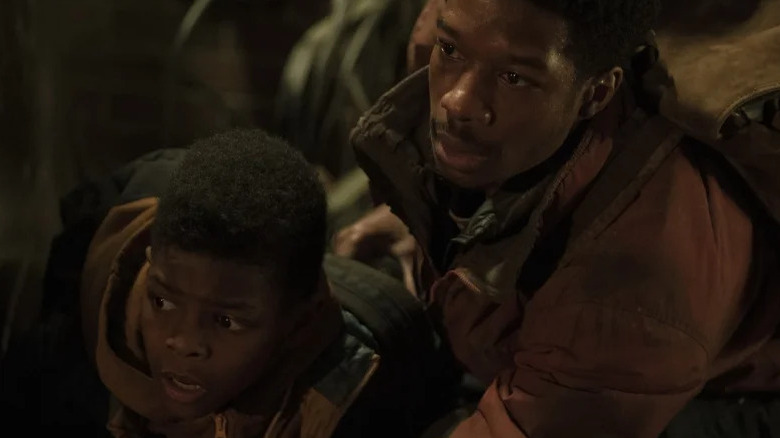
In the pivotal scene between Henry and Kathleen, Kathleen asks Henry if saving Sam was worth the consequences. She asks unironically — as the surrounding area burned because of her need for vengeance for her brother — "You think the whole world revolves around him? That he's worth ... everything?" The answer for Henry was, of course, yes. The answer for Bill was yes. And even if she refused to acknowledge it, for her brother, Kathleen's answer was yes, too. In this world, the loved ones you have left are truly your ride or dies. Survive together or die together, and if the latter isn't possible, avenge them 'til your dying breath. It's what she and Henry both did, in their own ways.
This one quote from Kathleen distills the most important theme of the series across games and TV series. The show is doing an excellent job of introducing characters and storylines that are preparing the audience for Joel's life-changing decision at the end of the season. Namely, these character arcs are preparing us to empathize with Joel's impossible choice, that being: if you had one chance to save the only person that makes life worth living after the world ends, would you sacrifice everything to do it? And if you couldn't save them, is their memory worth burning that world down for?
Read this next: 12 Things We'd Like To See In HBO's The Last Of Us
The post How The Last of Us Episode 5 Compares to the Original Video Game appeared first on /Film.
0 Comments